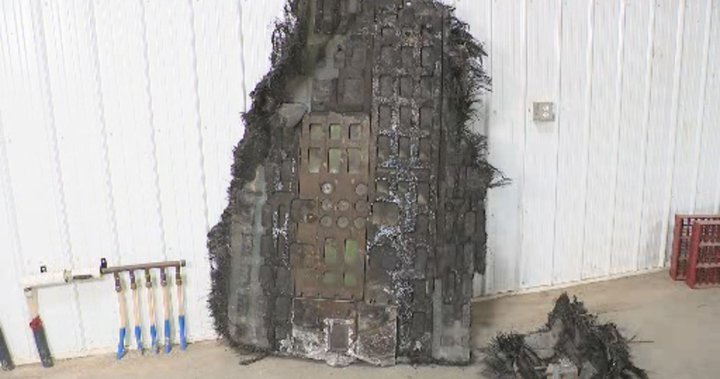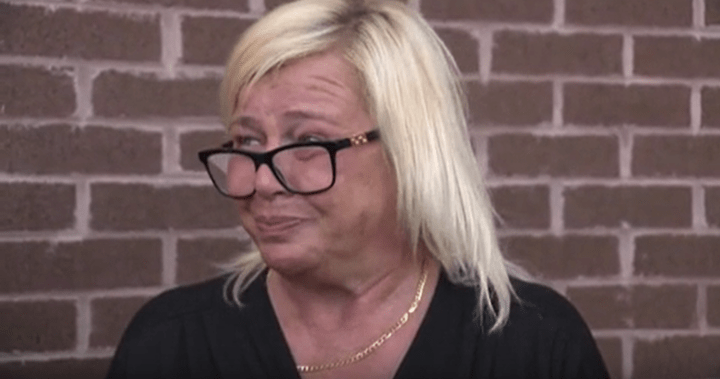In the past few years, there have been a variety of cases of space debris falling to Earth, with one object crashing through the roof of a Florida home in March and most recently, a piece of debris from a SpaceX spacecraft landing in a Saskatchewan farmer’s field.
That farmer is Barry Sawchuk and though some might be surprised, he said he’s just “going with the flow.”
“It is what it is, it’s just another day, another thing,” he said with a shrug when speaking with Global News.
Sawchuk farms with his three sons near Ituna, close to Regina, and was checking out the moisture in his fields at the end of April when he found the item. According to Sawchuk, it looked like a burned-up piece of carbon fibre with aluminum honeycombed in between, and included a hydraulic cylinder. He noted they also found a second smaller piece nearby on their land.
The family reached out to Samantha Lawler, associate professor of astronomy at the University of Regina, who said that on receiving a photo of the object she knew what it was.
“I saw a picture of it like, oh, that’s actually space junk, oh my God,” she told Global News in an interview. “That’s amazing, (and) also terrifying.”
Lawler then contacted one of her colleagues, Harvard astrophysicist Jonathan McDowell, who tracks space launches. He then determined what Sawchuk found was likely linked to a SpaceX Dragon spacecraft that had returned to Earth in February.

The Transportation and Safety Board of Canada confirmed there were no reports of aircraft that could explain the object.
The email you need for the day’s
top news stories from Canada and around the world.
The number of active satellites currently in orbit continues to increase as the next phase of the space race heats up and the private sector gets increasingly involved.
What has Lawler concerned is the question of what else could come crashing down next.
“All of this eventually will fall into Earth’s atmosphere and some of it will burn up and deposit that into our upper atmosphere as pollution, and some of it will make it to the ground and cause hazards for people on the ground,” she said.
“What if this had landed in Regina or Toronto, right? This would have killed people for sure.”
Who is responsible for space debris?
The risk of space debris hitting someone on the ground is relatively low. All launches in the U.S., for example, fall under the Orbital Debris Mitigation Standard Practices, which require the risk of a casualty from a re-entering rocket body to be below a one in 1,000 threshold.
But if such debris were to land on property and cause damage or even the death of someone, who is responsible?
“Any damage caused on Earth by a space object is subject to the full liability of a country that is responsible for it,” Thomas Cheney, an expert in space law, told Global News. “The United States is liable for damage caused by American satellites, even if they’re private companies.
The rules that govern such liability are outlined in the Outer Space Treaty, which, according to the United Nations’ Office of Outer Space Affairs, lays out that countries and states launching objects into orbit are responsible for national space activities whether by governmental or non-governmental entities, and that includes if those objects crash into Earth.

In the case of the debris in Sawchuk’s field, he said the company has been in touch with him by email and the two parties are negotiating on compensation, though a number has not yet been set.
Cheney, who is also a vice chancellors research fellow at Northumbria University in the U.K., told Global News that such negotiations for the company to directly pay Sawchuk are not uncommon.
“Obviously we don’t know what they’ve paid to this farmer, and in fact, the fact we don’t know is also a legal advantage because you’re not establishing a precedent about what the compensation package should look like,” he said.
Global News reached out to SpaceX to inquire about any negotiations but did not hear back by publication.
With more objects being launched, both Lawler and Cheney agree updates could be made to regulations surrounding outer space activities, with Cheney noting pressure could still be placed on international bodies to keep making things better.
“If this happened, (it) crashed into the streets of a major city, the story could be very different,” he said.
— with files from The Canadian Press and Global News’ Dave Parsons
© 2024 Global News, a division of Corus Entertainment Inc.





